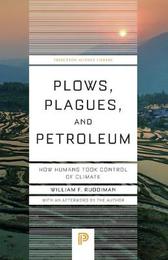
|
Plows, Plagues, and Petroleum: How Humans Took Control of Climate
Paperback / softback
Main Details
| Title |
Plows, Plagues, and Petroleum: How Humans Took Control of Climate
|
| Authors and Contributors |
By (author) William F. Ruddiman
|
| Series | Princeton Science Library |
|---|
| Physical Properties |
| Format:Paperback / softback | | Pages:240 | | Dimensions(mm): Height 216,Width 140 |
|
| Category/Genre | Popular science
Global warming
Social impact of environmental issues |
|---|
| ISBN/Barcode |
9780691173214
|
| Classifications | Dewey:304.25 |
|---|
| Audience | | General | | Tertiary Education (US: College) | |
|---|
| Edition |
Revised edition
|
| Illustrations |
7 Maps
|
|
Publishing Details |
| Publisher |
Princeton University Press
|
| Imprint |
Princeton University Press
|
| Publication Date |
4 October 2016 |
| Publication Country |
United States
|
Description
The impact on climate from 200 years of industrial development is an everyday fact of life, but did humankind's active involvement in climate change really begin with the industrial revolution, as commonly believed? Plows, Plagues, and Petroleum has sparked lively scientific debate since it was first published--arguing that humans have actually bee
Author Biography
William F. Ruddiman is a paleoclimatologist and professor emeritus at the University of Virginia.
ReviewsWinner of the 2006 Book Award in Science, Phi Beta Kappa "[A]n excellent book summarizing and placing in context the age-old influence of humans on atmospheric composition, climate and global warming."--Nature "If you're not familiar with Ruddiman's hypothesis, you should be... Plows, Plagues, and Petroleum is excellent reading for scientist and nonscientist alike."--James White, Science "Ruddiman's argument makes it clear that there is no 'natural' baseline of climate in the late Holocene from which to reckon the human impact of the past two centuries."--Wolfgang H. Berger, American Scientist "What is most remarkable about Ruddiman's work is the evidence it provides for an initial disruption to the climate system that occurred long before the industrial revolution--around 8,000 years ago... Ruddiman's realisation that the gaseous composition of Earth's atmosphere is an exquisitely sensitive barometer of changes to life itself represents a great breakthrough."--Tim Flannery, Guardian "William Ruddiman's provocative but plausible conclusion is that the economic behavior of humans began to profoundly influence global climate roughly 8000 years ago... Ruddiman's book has already begun to spark an important debate--a debate which economic historians should be eager to follow and join."--Robert Whaples, EH.net "This well-written book does a great job of summarizing complex topics through simple calculations and examples, and provides the right balance of cultural background and scientific data."--Matthew S. Lachniet, Geotimes "The book by Ruddiman is very enjoyable and easy to read. It also takes quite a unique perspective on the relationship between human societies and climate. For Ruddiman, rather than the climate being a determinant of the course of human events, the argument is turned on its head making human economic behavior a cause of climate change, even well into distant antiquity."--Arlene Miller Rosen, Nature and Culture "Ruddiman's short book is an excellent primer on the various influences on global climate. He explains scientific concepts clearly and accessibly, and his melding of climate science and human history is fascinating. For these reasons alone, the book is worth reading."--Erik M. Conway, Journal of the History of Biology "Plows, Plagues, and Petroleum is a primer on natural variations in Earth's climate and on how human activity is having even more of an impact. While some readers might find it disturbing that people have been influencing the planet's climate for millennia, others may be even more alarmed to think about climate changes yet to come."--S. Perkins, Science News "[Ruddiman] reviews the ongoing debate about future climate change and provides a balanced and judicious assessment of the challenges ahead. This book offers valuable new insights into one of the world's most demanding environmental challenges."--Population and Development Review "The book is instructive and refreshingly non-technical in its prose. It also offers insight to historians as to how they might think about scientific and environmental processes ... And draw on these materials to write history... Given our contemporary industrial capacity, it rises some serious questions and concerns over the fragility of the physical environment and our relationship with it."--Michael Egan, Left History "Contentious though they are, Ruddiman's arguments are never mere speculation. The book does an excellent job explaining the basic atmospheric science behind glacial cycles, and it presents convincing quantitative evidence of past atmospheric changes, pointing out the likely role of anthropogenic deforestation and agriculture in the late Holocene. The author's credentials as an established climate scientist lend further weight to the theory."--Sam White, Technology and Culture
|